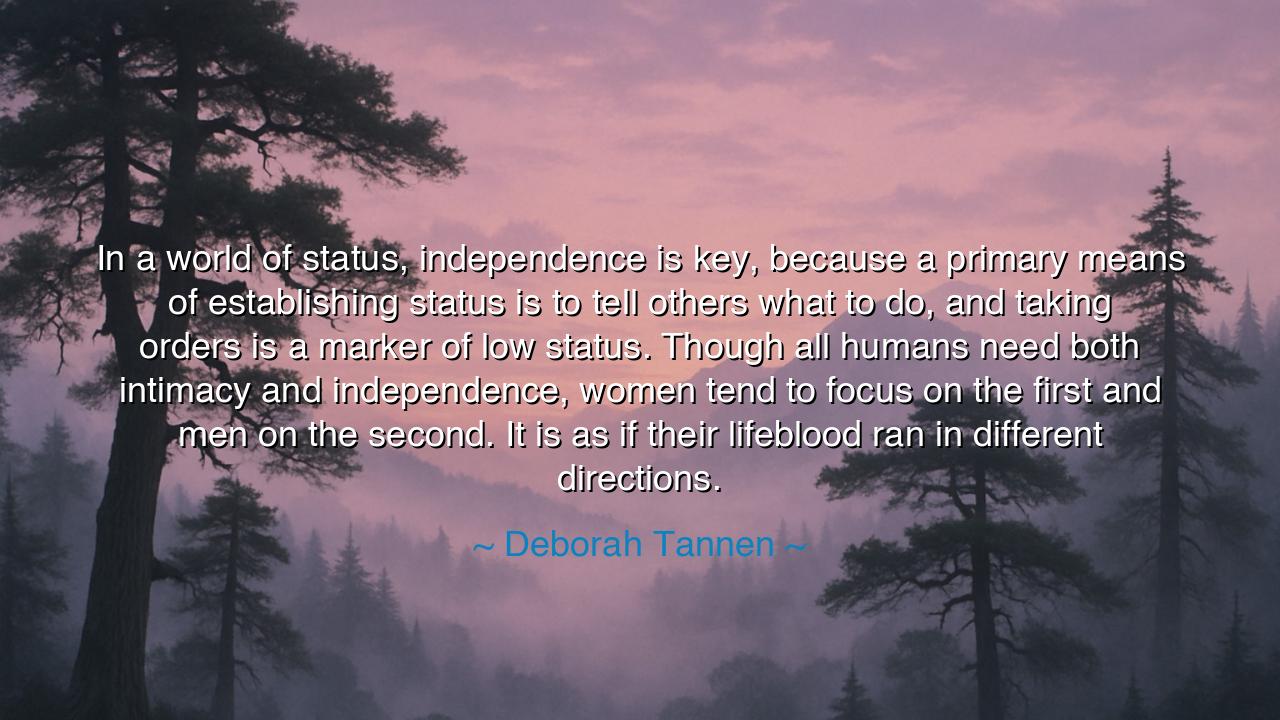
In a world of status, independence is key, because a primary
In a world of status, independence is key, because a primary means of establishing status is to tell others what to do, and taking orders is a marker of low status. Though all humans need both intimacy and independence, women tend to focus on the first and men on the second. It is as if their lifeblood ran in different directions.






“In a world of status, independence is key, because a primary means of establishing status is to tell others what to do, and taking orders is a marker of low status. Though all humans need both intimacy and independence, women tend to focus on the first and men on the second. It is as if their lifeblood ran in different directions.” So spoke Deborah Tannen, the wise scholar of words, who looked upon the human heart and saw the eternal dance between connection and autonomy. Her words are not merely about gender, but about the very forces that shape human nature — the twin rivers of closeness and freedom, flowing through all relationships, shaping our desires, our conflicts, and our understanding of power.
From the dawn of time, men and women have stood together at the edge of creation, gazing upon the same horizon, yet seeking different paths toward meaning. The ancients told us that balance is the root of harmony — yet balance is not stillness. It is motion held in grace. So it is with intimacy and independence. One draws us inward — to love, to nurture, to belong. The other drives us outward — to conquer, to build, to define the self. In every generation, humanity has wrestled between these two sacred pulls: the need to be one with others, and the need to be one with oneself.
In Tannen’s insight, status becomes the measure by which societies weigh the value of these desires. To hold power is to give direction; to lack power is to receive it. Thus, in a world that prizes command, independence is the key to worth. The warrior, the leader, the builder — all are exalted because they seem to answer to no one but their own will. Yet this vision, though powerful, is not whole. For even the mightiest king must rest his head upon another’s faith, and even the strongest woman cannot thrive without the warmth of belonging. Intimacy and independence are not rivals, but siblings — two halves of the same spirit.
Consider the tale of Queen Elizabeth I, the Virgin Queen, who ruled alone in a world of men. She chose independence over union, sovereignty over marriage, and by her hand England entered its golden age. Her strength was unshaken, her will iron, yet behind the crown was a woman who bore the cost of solitude. Her greatness came from mastery of self, but her heart bore the echo of all that she denied. In her, the truth of Tannen’s words resounds — for to choose independence too fiercely is to hunger for intimacy, and to choose intimacy too fully is to risk the loss of independence.
In the daily lives of mortals, this struggle plays out in smaller but no less sacred ways. The husband who seeks respect may forget tenderness; the wife who offers care may silence her own needs. The child who yearns to please may lose the sound of his own voice; the leader who clings to power may lose the warmth of those he commands. Thus, the great art of living is to weave the threads of status, intimacy, and independence into a single tapestry — where strength does not crush compassion, and closeness does not consume the self.
The ancients would have said: the lion and the dove must both live in the heart. For independence without love is emptiness, and intimacy without selfhood is bondage. Each soul must learn when to stand firm and when to yield, when to lead and when to listen. To live wisely is to know that power and tenderness are not enemies, but partners in the grand dance of life.
And so, let this teaching be carried forward: in a world that worships status, remember the greater truth — that independence without compassion is hollow, and intimacy without freedom is fragile. Seek to master both. Build your strength, but let your strength make room for others. Speak boldly, but listen deeply. Love fully, but never lose the flame of your own will.
For the wise know that to live well is not to choose one path alone, but to walk the narrow bridge between intimacy and independence — steady, balanced, and whole — until the end of all things.






AAdministratorAdministrator
Welcome, honored guests. Please leave a comment, we will respond soon